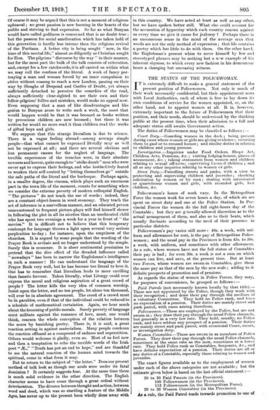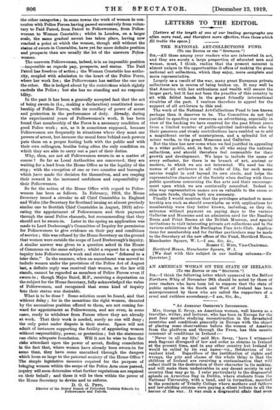THE STATUS OF THE POLICEWOMAN.
IT is extremely difficult to make a general statement of the present position of Policewomen. Not only is much of their work necessarily confidential, but their appointment rests with Local Authorities, each of whom is free to lay down its own conditions of service for the women appointed, or, on the other hand, not to appoint women at all. It is, however, extremely important to the future of Policewomen that their position, and their needs, should be understood by the thinking public at the present time, when their admission to a full and adequate status still awaits Government action.
The duties of Policewomen may be classified as follows : Court Duty.—Guarding women in the dock ; being present during cases where women or girls are giving evidence ; escorting them to gaol or to remand homes ; and similar duties in relation to children and young persons.
Inveatigation.—Inquiries under Food Orders, Shops Act, Children Acts, Pensions, &c. ; visiting lodging-houses, places of amusement, &c. ; taking statements from women and children relating to sexual offences; supervising liems.cd children ; and all or any other inquiries relating to women or girls.
Street Duty.—Patrolling streets and parks, with a view to protecting and supervising children and juveniles ; checking solicitation by women or by men ; dealing with intoxicated or quarrelsome women and girls, with stranded girls, loot children, &c.
Policewomen's hours of work vary. In the Metropolitan Force the women work for seven hours a day, of which six are spent on street duty and one at the Police Station. In Provincial Forces the women do the full eight-hours day of the Constable ; but they are generally-allowed discretion as to the actual arrangement of them, and also as to their beats, which usually fluctuate according to the need of their presence in particular districts.
Policewomen's pay varies still more : 48s. a week, with uniform and allowances for rent, is the pay of Metropolitan Policewomen ; and the usual pay in the Provinces is from 45s. to 50s. a week, with uniform, and sometimes with other allowances. As a rule, where women have not the full status of Constables their pay is bad ; for even 50s. a week is not a sum on which women can live, and save, at the present time. But at least two Forces, whose women are sworn-in Constables, give them the same pay as that of the men by the new scale ; adding to it definite prospects of promotion and of pensions.
As regards the status of women in Police Forces, they may, for purposes of convenience, be grouped as follows : Paid Patrols (not necessarily known locally by that title).— These are not appointed by the Police, though they work with their recognition ; and draw their pay through the medium of a voluntary Committee. They hold no Police rank, and have no expectation of a pension. Their duties are mainly street and park patrol, with cases arising therefrom. Policewomen--These are employed by the Police, but are not sworn-in ; they draw their pay through the usual Police channels, but generally at a very low rate. They hold, usually, no Police rank, and have seldom any prospect of a pension. Their duties are mainly street and park patrol, with occasional Court, escort, or investigation duty.
Women Constables.—These are sworn-in as members of Police Forces. They draw their pay through the usual Police channels, sometimes at the same rate as the men, sometimes at a lower rate. They hold Police rank as Constables, Sergeants, &c., and have definite expectation of a pension. Their duties are all or any duties of a Constable, especially those relating to women and juveniles.
The exact figures available as to the employment of women under each of the above categories are not available ; but the estimate given below is based on the last official statement :—
20 to 30 Paid Patrols (in the Provinces). 100 Policewomen (in the Provinces).
. 20 to 30 Women Constables (in the Provinces).
As a rule, the Paid Patrol tends towards promotion to one of the other categories ; in some towns the work of women in connexion with Police Forces having passed successively from voluntary to Paid Patrol, from Patrol to Policewoman, from Policewoman to Woman Constable ; whilst in London, on a larger scale, the same gradual ascent has taken place, having now reached a point at which the woman, though still without the status of sworn-In Constables, have yet far more definite position and prospects than are usually the lot of the unsworn Policewoman.
The unsworn Policewoman, indeed, is in an impossible position —impossible as regards pay, prospects, and status. The Paid Patrol has freedom of action ; the Woman Constable has authority, coupled with admission to the heart of the Police Force, where her work lies ; the Policewoman has neither the one nor the other. She is hedged about by the restrictions which rightly enoirele the Police ; but she has no standing and no responsibility.
In the past it has been a generally accepted fact that the act of being sworn-in (i e , making a declaration) constituted membership of Police Forces, with its corollary of power of arrest and protection in the performance of duty. Already, during the experimental years of Policewomen's work, it has been found that membership of the Force is a necessary condition of good Police work ; not, as it is sometimes supposed, because Policewomen are frequently in situations where they must use powers of arrest, but because the moral force behind such powers puts them on a proper footing both with the public and with their own colleagues, besides being often the only condition on which they are able to carry out a part of their duties.
Why, then, are not all Policewomen sworn-in as a matter of course ? So far as Local Authorities are concerned, they are waiting for a lead from the Home Office as to the legality of the step ; with the exception of one or two counties and boroughs which have made the decision for themselves, and are reaping their reward in the increased usefulness and responsibility of their Policewomen.
So far the action of the Home Office with regard to Policewomen has been as follows. In February, 1919, the Home Secretary issued a. circular to all Chief Constables in England and Wales (the Secretary for Scotland issuing an almost precisely similar one to Scottish Chief Constables in August, 1919) advocating the appointment of Policewomen and their payment through the usual Police channels, but recommending that they should not be sworn-in. Later in the spring an application was made to Lord Desborough's Committee of Inquiry for permission for Policewomen to give evidence on their pay and conditions of service ; this was refused by the Home Secretary on the ground that women were outside the scope of Lord Desborough's inquiry. A similar answer was given to a question asked in the House of Commons on the same subject ; whilst a request for a special inquiry into Policewomen's work and status was " deferred to a later date." In the summer, when an amendment was moved to include women under the provisions of the Police Ant of August last, a definite reply was received that women, as the law still stands, cannot be regarded as members of Police Forces even if sworn-in ; though Major Baird, M.P., receiving a deputation on the subject for the Home Secretary, fully acknowledged the value of Policewomen, and recognized that some kind of inquiry Into their status was desirable.
What is to be done ? Some solution must be found, and that without delay ; for in the meantime the right women, daunted by the anomalous position offered to them, are not coming forward for appointment as Policewomen, and are even, in some cases, ready to withdraw from Forces where they are already at work. That their work is needed, surely no one will deny ; the only point under dispute is their status. Space will not admit of instances supporting the futility of appointing women without responsibility, power, or protection ; but the statement can claim adequate foundation. Will it not be wise to face the risks attendant upon the power of arrest, finding consolation in the fact that, where women have already been sworn-in for some time, they have come unscathed through the dangers which loom so large to the paternal anxiety of the Home Office ? The simple legislative measure required for the purpose of bringing women within the scope of the Police Acts once passed, inquiry will soon determine what further regulations are required on their behalf ; and these it will be then within the power of the Home Secretary to devise and to enforce.



















































 Previous page
Previous page